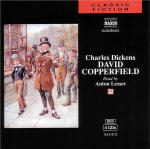
HOME || Art|| Biography || Business || Crime Stories || Fiction || Foreign Languages|| Healthy Living || History || Humor ||
Kids Books Radio Shows || Spiritual || Self Help || TV/Film ||
David Copperfield
Written By : Charles Dickens
Narrated By : Anton Lesser
Published By : Select Music & Distribution
Runtime : 5 hours 15 minutes
Classics
Download Price : $18.75
Purchase...
In David Copperfield (1850) Dickens wrote the most nearly autobiographical of his novels, pouring into it an intensity of personal feeling that is matched only by the later Great Expectations which, if it is in any sense autobiographical, is so only in a far more subtle and elusive way. In a preface to the 1869 edition of David Copperfield, Dickens frankly avows his personal interest: 'Of all my books, I like this the best. It will be easily believed that I am a fond parent to every child of my fancy, and that no one can ever love that family as dearly as I love them. But, like many fond parents, I have in my heart of hearts a favourite child. And his name is David Copperfield.' This almost passionate statement gives a vital clue to what is perhaps the dominant theme of the book: the search for a family and a home which occupies the hero almost throughout the narrative, at least from that moment when his blissful Eden is turned into hell by the advent of the cruel Murd-stones.
Cast out, first to the brutal school Salem House and thereafter to the warehouse of Murdstone and Grinby, the young David must fight to discover love and security. His journey to Dover represents the story of the novel in little: as elsewhere, the effort, the act of faith, is rewarded. But Dickens enriches and intensifies the essential theme by artful repetition in other forms: the amiably insane Mr. Dick, for example, had himself been rescued many years ago by the intre pid Betsey Trotwood from an unsympathetic brother, while (in what is perhaps the most glowingly rendered picture of domesticity in the novel) Mr. Peggotty cares for two orphans and a widow.
Put simply, then, the tension in the novel is between those who exploit or torment - Steerforth the charming seducer, Creakle the bullying headmaster - and those whose capacity to give is boundless and unconditional - Mr. Peggotty and his sister. If generosity triumphs ultimately over selfishness, it is not without grievous loss, the tragedy of Little Emily colouring much of the later narrative. And Dickens is not interested here in simple villainy or simple goodness alone: Steerforth is perhaps the most brilliantly drawn character in the novel, a man who is aware of his own faults, conscious that (ironically, in view of his name) he lacks, or crucially has lacked, guidance.
Yet this is not a Dickens novel dominated by the strong social themes we find in so many of his later works: generations of readers have loved this novel in much the same way, perhaps, as its creator did, for its warmth of characterisation, broad scope of human sympathy, and strong vein of humour. Typically, he uses both caricatures and naturalistic figures; equally typical is the alternation between melodrama and deeply felt, entirely credible situations. And probably the best part of the novel is the first half - in other words, the evocation of childhood, which is quite simply unmatched in literature -although, of course, Dickens' narrative skill and the sympathetic nature of his hero compel our attention to the end, helped by the unforgettably repulsive Uriah Heep and the splendidly comic Micawbers for whom something, in the end, does 'turn up'.
Other Audio Books you may be interested in

Mr ParadiseWritten By : Elmore LeonardNarrated By : Robert ForsterPublished By : Harper Collins USRuntime : 8 hoursThrillers
|

Venus in CopperWritten By : Lindsey DavisNarrated By : Anton LesserPublished By : BBC Audiobooks LtdRuntime : 3 hoursHistorical
|

Black Adder, TheWritten By : VariousNarrated By : Full Cast ProductionPublished By : BBC Audiobooks LtdRuntime : 3 hoursAdult
|

March to the SeaWritten By : David Weber and John RingoNarrated By : Stefan RudnickiPublished By : Blackstone Audio IncRuntime : 17 hours 30 minutesSci-FiDownload Price : $33.95
Prince Roger was a whiny, useless spoiled brat—that is, until he was marooned with his bodyguards on the vicious planet Marduk. Facing damnbeasts and killerpillars, Roger turns out to be a true scion of his warrior dynasty after all. His guards are determined now to get him home—but the planet... More...
|

Last Detective, TheWritten By : Robert CraisNarrated By : James DanielsPublished By : Brilliance Audio IncRuntime : 7 hours 59 minutesHorror & Suspense
|
BaileyWick Audiobooks
Iseekblog audio Books
Wliaonline AUDIOBOOKS
Maccvs Audio books


